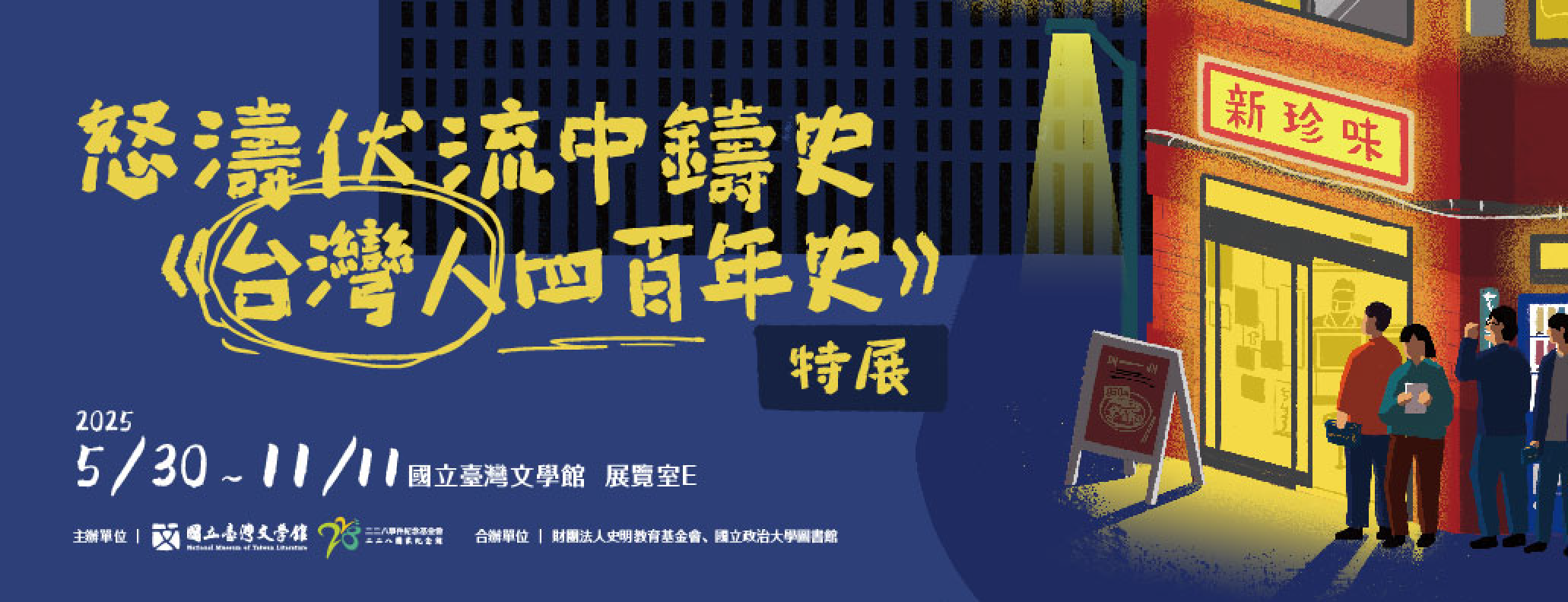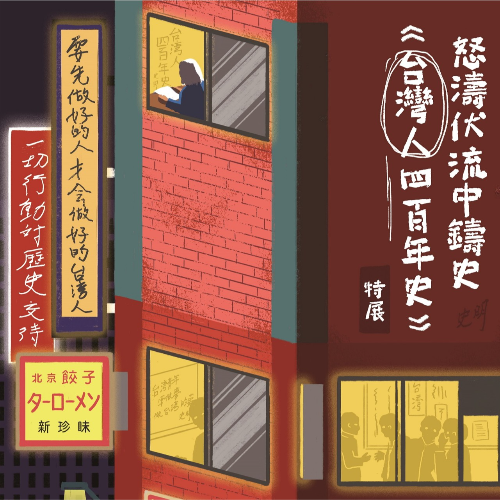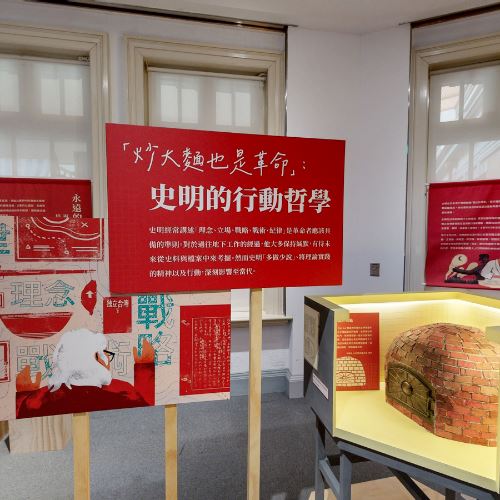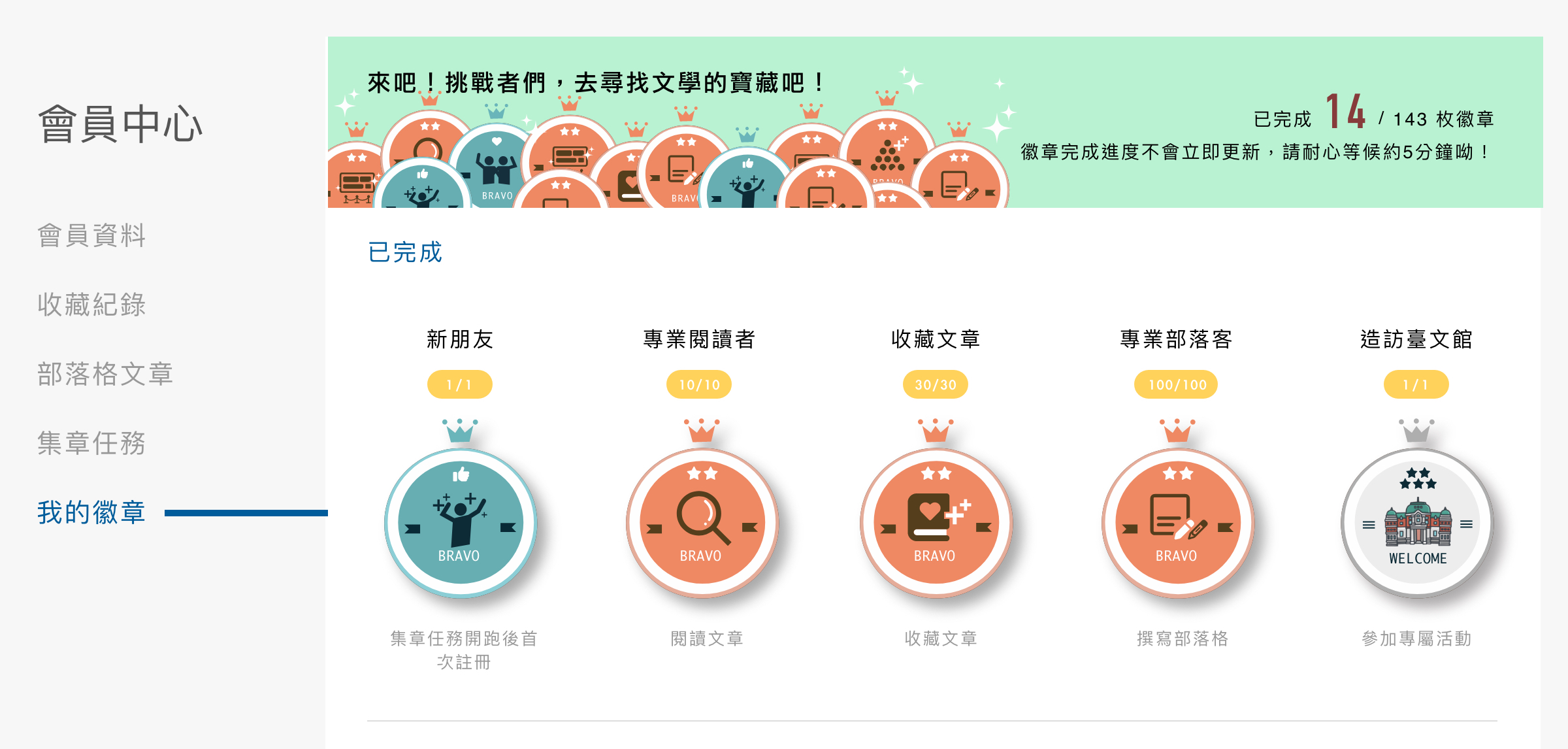To Each Their Battle:
The Fiery Youth of Taiwanese Literature

Su Beng's pursuit of leftist ideals and his unwavering commitment to Taiwanese nationalism stemmed from his education under Japanese colonial rule and his lived experience as a colonial subject. Indeed, in their search for a collective path forward for Taiwan, many young Taiwanese of the Japanese era absorbed global currents of thought, just as Su Beng did. Though their chosen routes differed, they shared the same selfless dedication.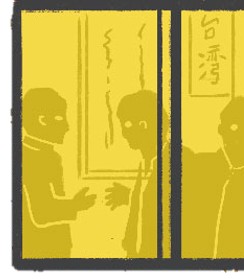
4-1 Yang Kuei: A Writer Giving Voice to the Public

Yang Kuei was one of the leading leftist writers of 1930s Taiwan. His magnum opus, Shimbun Haitatsu Fu ("The Newspaper Delivery Man" in Mandarin translation), depicts Taiwanese and Japanese working-class youths overcoming ethnic differences to struggle together against the bourgeoisie. He organized several peasant movements in opposition to the injustices of capitalism under Japanese colonial rule. In the early postwar years, Yang Kuei was arrested by the Kuomintang government for his "Declaration of Peace" and was imprisoned on Green Island for 12 years. After his release, he lived in seclusion in Taichung. With the rise of the nativist movement of the 1970s, he continued to carry forward the traditions and spirit of literary movements from the Japanese era.
4-2 Lu Ho-jo: From Leftist Activist to "Taiwan's First Literary Genius"

Lu Ho-jo, often called "Taiwan's First Literary Genius," was not only a literary writer but also a gifted vocalist and pianist. His works frequently critiqued traditional society and reflected the voices of ordinary people amid changing times. After experiencing the February 28 Incident in the postwar period, Lu Ho-jo, disillusioned with Kuomintang rule, joined the underground Taiwan Province Working Committee. He disappeared during the Luku Incident in 1950. Only in recent years has Taiwanese society begun to gradually rediscover Lu Ho-jo's life and thoughts.
4-3 Chung I-jen: Commander of the 27 Brigade,
Recounting Memories of the February 28 Incident

During the Japanese colonial period, Chung I-jen got to know members of the Taiwan Cultural Association. When the February 28 Incident broke out, he organized youths and students in Taichung to form the 27 Brigade in resistance against the military sent to suppress the uprising. After the Brigade disbanded, he was arrested and sentenced to at least 15 years in prison. Following his release, Chung long avoided discussing political issues. Later, encouraged by writer Li Chiao, he began writing his memoirs, recounting the experiences of the 27 Brigade and giving voice to his life as a political victim. In doing so, he preserved a vital historical record of the dramatic and harrowing story of the 27 Brigade.
4-4 Wang Yu-te: An Exiled Dissident Devoted to Taiwan

Wang Yu-te was a writer, linguist, and Taiwanese independence activist who lived in exile in Japan. His elder brother, Wang Yu-lin—a poet and the first Taiwanese to serve as a public prosecutor in mainland Japan during the colonial period—returned to Taiwan after the war, only to be killed during the February 28 Incident. Wang Yu-te subsequently fled to Japan, where he pursued further studies and became active in the Taiwan independence movement. While in Japan, he completed significant phonological research on Taiwanese (Hoklo) and wrote extensively on Taiwan's history. In 1964, he published Taiwan: A History of Torment, making his voice heard abroad on behalf of Taiwan's history, alongside Su Beng's efforts.


Yang Kuei,”The Camp of the Working Class” (1)
Yang Kuei (1906-1985) was a leftist writer and social activist during the Japanese colonial period.
Exposed to socialist thought and movements in Japan,
he returned to Taiwan to organize farmers’ movements and reading circles.
This document discusses the antagonism between capitalist parties and workers’ parties,
analyzes union–communist party relations, and explores their tactical strategies.
It is believed to be translated from Marxist literature.
(Collection of the National Museum of Taiwan Literature / Donated by Yang Chien, Accession no. NMTL20050040064)


Yang Kuei, “Writer, Life, Society”(2)
This notebook records Yang Kuei’s reflections on literature. It distinguishes between fiction and nonfiction,
underscores the importance of writers engaging more deeply with real life, and the necessity of understanding socialist thought.
(Collection of the National Museum of Taiwan Literature / Donated by Yang Chien, Accession no. NMTL20050040066)


Wang Yu-te, “A Record of the Taiwanese Language (3)
Wang Yu-te (1924-1985), a first-generation postwar independence activist,
earned a doctorate in literature at the University of Tokyo with his “Study of the Min Dialect” and became a leading authority on Taiwanese linguistics.
This draft, one version of Chapter 2 of the serialized column “Taiwanese Language Lecture”, introduces Chinese character notation and previews Romanization in the next installment.
Drawing fromThe Tale of the Lychee Mirror, Wang argued that early Taiwanese-language texts should also be considered works of Taiwanese literature.
(Collection of the National Museum of Taiwan Literature / Donated by Meiri KINTO, Accession no. NMTL20080210002)

Wang Yu-te,"A Brief Introduction to Postwar Taiwanese Literature"(4)
In this essay, Wang Yu-te reviews the development of postwar Taiwanese literature,
identifying transitioning from language to language as one of its greatest difficulties.
Collection of the National Museum of Taiwan Literature / Donated by the family of Wu Shou-li
Accession no. NMTL20090490885

Chung I-Jen, Sixty Years of Bitterness, Sequel (excerpt) )(5)
Chung I-Jen (1921-2023) organized the 27 Brigade to resist Kuomintang forces during the February 28 Incident.
He was later imprisoned and remained politically silenced until the 1980s, when he began writing his memoirs.
This passage describes what he saw in prison and his conflicts with fellow inmates accused of being communist spies.
(Collection of the National Museum of Taiwan Literature / Donated by Chung I-Jen, Accession no. NMTL20120210105-003)

Chung I-Jen's Release Certificate from Taiwan Garrison Command (6)
This certificate documents Chung I-Jen’s release from prison, recording personal data, related notes,
and post-release reporting requirements—evidence of the detailed surveillance system in place under martial law.
(Collection of the National Museum of Taiwan Literature / Donated by Chung I-Jen, Accession no. NMTL20230050066)

Taiwan High Court Criminal Verdict in the Case of Chung I-Jen and Wu Chin-tsan (copy) (7)
This copy, preserved by Chung I-Jen, records the judicial proceedings in his and Wu Chin-tsan's trial.
It records the operation of the judiciary under authoritarian rule and serves as a crucial historical source for studying the February 28 Incident.
(Collection of the National Museum of Taiwan Literature / Donated by Chung I-Jen, Accession no. NMTL20230050069)

Lu Ho-jo, Autumn (8)
Lu Ho-jo (1914-1950) was a writer of the Japanese colonial period.
This is his only published short story collection, which was released in 1944 and contains seven works.
Celebrated as a literary prodigy,
Lu joined underground resistance activities after the war and disappeared while fleeing political persecution.
(Collection of the National Museum of Taiwan Literature / Donated by Hsu Su-lan, Accession no. NMTL20110090001)
Organizer / National Museum of Taiwan Literature, National 228 Memorial Museum|Memorial Foundation of 228
Co-organizer / Su Beng Education Foundation, National Chengchi University Library (NCCU Library)
